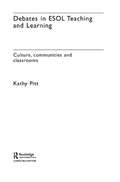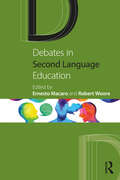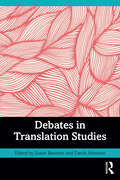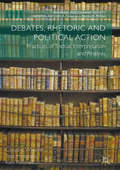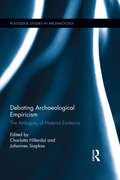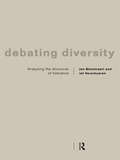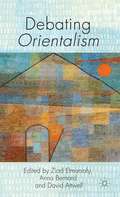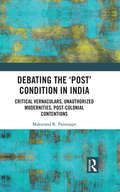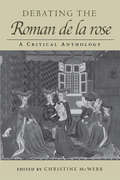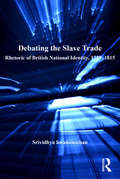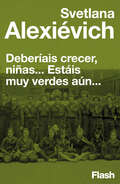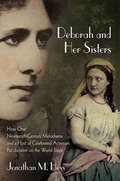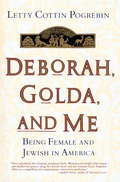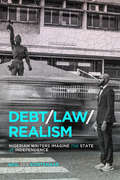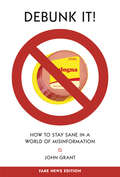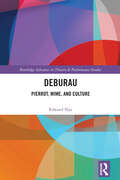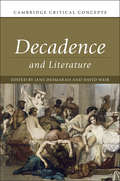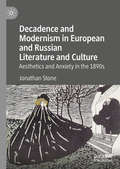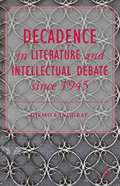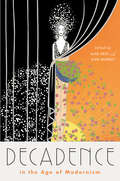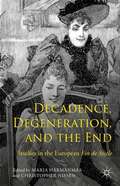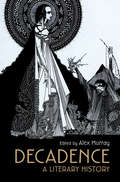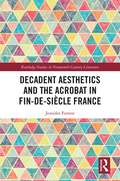- Table View
- List View
Debates in ESOL Teaching and Learning: Cultures, Communities and Classrooms (New Approaches to Adult Language, Literacy and Numeracy)
by Kathy PittThis unique book provides a lively introduction to the theory and research surrounding the adult learning of English for Speakers of Other Languages. Offering a digest and discussion of current debates, the book examines a wide geographical and social spread of issues, such as: * how to understand the universal characteristics of learning an additional language* what makes a 'good' language learner* multilingualism and assumptions about monolingualism* learning the written language* the effect of recent Government immigration policy on language learning processes. As a majority of adults learning ESOL are from communities of immigrants, refugees and asylum seekers, understanding the diversity of social and personal history of learners is a critical dimension of this book. It also recognises the social pressures and tensions on the learners away from the classroom and discusses various types of classroom and language teaching methodologies. Full of practical activities and case studies, this book is essential reading for any basic skills teacher undertaking a course of professional development, from GNVQ through to post-graduate level.
Debates in Second Language Education (Debates in Subject Teaching)
by Ernesto Macaro Robert WooreDebates in Second Language Education provides an up-to-date account of the key debates and areas of controversy in the field of second language learning and teaching. Adopting a broad and comparative perspective and emphasising the importance of considering a variety of learning contexts, it encourages students and practising teachers to engage with contemporary issues and developments in learning and teaching. Chapters are designed to stimulate thinking and understanding in relation to theory and practice, and help language educators to make informed judgements by arguing from a position based on theoretical knowledge and understanding. Bringing together leading contributors in the field, the book discusses a wide range of issues relating to second language learning and teaching including: the relationship between age and success in language learning aptitude versus motivation as predictors of successful language learning linguistic diversity and plurilingualism the teaching of grammar and vocabulary the value of phonics learning pronunciation the second language only versus the multilingual debate With reflective points in every chapter, Debates in Second Language Education will be a valuable resource for any student or practising teacher, as well as for those engaged in initial teacher education, continuing professional development or Master's level study. It will also be of interest to second language acquisition researchers and those studying applied linguistics.
Debates in Translation Studies
by Susan Bassnett David JohnstonTranslation Studies has been an extraordinary success story which grew out of the work of a small group of international scholars in the 1970s and has become a global phenomenon. As the field has rapidly expanded, it has also diversified. This collection of essays, by world-leading translation specialists, sheds light on some of the major shifts in thinking about translation that are taking place today.The authors here engage with the most contentious issues within translation studies and cover topics ranging from examining the scope for machine and human translation to develop together, to addressing the role of translation in the age of the Anthropocene and considering how we prepare translators for the complexities of contemporary communication.Written in an accessible and engaging style and with an emphasis on challenging orthodoxies and encouraging critical thinking, this is essential reading for all advanced students of translation studies and literature in translation.
Debates, Rhetoric and Political Action
by Kari Palonen Claudia Wiesner Taru HaapalaThis book explicates how debates and documents can be understood, interpreted and analysed as political action. It offers the reader both a theoretical introduction and practical guidance. The authors deploy the perspective that debates are to be understood as political activity, and documents can be regarded as frozen debates. The first chapter discusses what is to be understood as politics and political. The second chapter explains the concept of debate as an exchange of arguments in speaking pro and contra. The third chapter presents concrete approaches, research practices and experiences that help analysing debates and documents as politics. The fourth chapter consists of a number of case studies that demonstrate how researchers can proceed in analysing parliamentary debates, documents, laws, and media articles. This book will be of use to all students and scholars interested in analysing texts and documents, as well as in political rhetoric and parliamentary debates.
Debating Archaeological Empiricism: The Ambiguity of Material Evidence (Routledge Studies in Archaeology)
by Charlotta Hillerdal Johannes SiapkasDebating Archaeological Empiricism examines the current intellectual turn in archaeology, primarily in its prehistoric and classical branches, characterized by a return to the archaeological evidence. Each chapter in the book approaches the empirical from a different angle, illuminating contemporary views and uses of the archaeological material in interpretations and theory building. The inclusion of differing perspectives in this collection mirrors the conceptual landscape that characterizes the discipline, contributing to the theoretical debate in archaeology and classical studies. As well as giving an important snapshot of the practical as well as theoretical uses of materiality in archaeologies today, this volume looks to the future of archaeology as an empirical discipline.
Debating Diversity: Analysing the Discourse of Tolerance
by Jan Blommaert Jef VerschuerenImmigration, racism and nationalism have become hotly debated issues in the Western world. This highly original and controversial work focuses on the language used by the vast majority who regard themselves as being open to a multi-cultural society.Using Belgium as a case study and drawing parallels with the UK, US, Europe and the former Yugoslavia, the authors analyse this language and reveal a remarkable consistency between these liberal voices, such as in news-reporting, and the language used by radical racist and nationalist groups.
Debating Orientalism
by David Attwell Ziad Elmarsafy Anna BernardEdward Said continues to fascinate and stir controversy, nowhere more than with his classic work Orientalism. Debating Orientalism brings a rare mix of perspectives to an ongoing polemic. Contributors from a range of disciplines take stock of the book's impact and appraise its significance in contemporary cultural politics and philosophy.
Debating Self-Knowledge
by Gary Ebbs Anthony BruecknerLanguage users ordinarily suppose that they know what thoughts their own utterances express. We can call this supposed knowledge minimal self-knowledge. But what does it come to? And do we actually have it? Anti-individualism implies that the thoughts which a person's utterances express are partly determined by facts about their social and physical environments. If anti-individualism is true, then there are some apparently coherent sceptical hypotheses that conflict with our supposition that we have minimal self-knowledge. In this book, Anthony Brueckner and Gary Ebbs debate how to characterize this problem and develop opposing views of what it shows. Their discussion is the only sustained, in-depth debate about anti-individualism, scepticism and knowledge of one's own thoughts, and will interest both scholars and graduate students in philosophy of language, philosophy of mind and epistemology.
Debating the 'Post' Condition in India: Critical Vernaculars, Unauthorized Modernities, Post-Colonial Contentions
by Makarand R. ParanjapeHow was the post-modernist project contested, subverted and assimilated in India? This book offers a personal account and an intellectual history of its reception and response. Tracing independent India’s engagement with Western critical theory, Paranjape outlines both its past and ‘post’. The book explores the discursive trajectories of post-modernism, post-colonialism, post-Marxism, post-nationalism, post-feminism, post-secularism — the relations that mediate them — as well as interprets, in the light of these discussions, core tenets of Indian philosophical thought. Paranjape argues that India’s response to the modernist project is neither submission, willing or reluctant, nor repudiation, intentional or forced; rather India’s ‘modernity’ is ‘unauthorized’, different, subversive, alter-native and alter-modern. The book makes the case for a new integrative hermeneutics, the idea of the indigenous ‘critical vernacular’, and presents a radical shift in the understanding of svaraj (beyond decolonisation and nationalism) to express transformations at both personal and political levels. A key intervention in Indian critical theory, this volume will interest researchers and scholars of literature, philosophy, political theory, culture studies and postcolonial studies.
Debating the Roman de la Rose: A Critical Anthology (Routledge Medieval Texts)
by Christine McwebbAround the year 1400, the poet Christine de Pizan initiated a public debate in France over the literary "truth" and merit of the Roman of the Rose, perhaps the most renowned work of the French Middle Ages. She argued against what she considered to be misrepresentations of female virtue and vice in the Rose. Her bold objections aroused the support and opposition of some of the period’s most famous intellectuals, notable Jean Gerson, whose sermons on the subject are important literary documents. "The Quarrel of the Rose" is the name given by modern scholars to the collection of these and other documents, including both poetry and letters, that offer a vivid account of this important controversy. As the first dual-language version of the "Quarrel" documents, this volume will be of great interest to medievalists and an ideal addition to the Routledge Medieval Texts series. Along with translations of the actual debate epistles, the volume includes several relevant passages from the Romance of the Rose, as well as a chronology of events and ample biography of source materials.
Debating the Slave Trade: Rhetoric of British National Identity, 1759–1815 (Ashgate Ser. In Nineteenth-century Transatlantic Studies)
by Srividhya SwaminathanHow did the arguments developed in the debate to abolish the slave trade help to construct a British national identity and character in the late eighteenth century? Srividhya Swaminathan examines books, pamphlets, and literary works to trace the changes in rhetorical strategies utilized by both sides of the abolitionist debate. Framing them as competing narratives engaged in defining the nature of the Briton, Swaminathan reads the arguments of pro- and anti-abolitionists as a series of dialogues among diverse groups at the center and peripheries of the empire. Arguing that neither side emerged triumphant, Swaminathan suggests that the Briton who emerged from these debates represented a synthesis of arguments, and that the debates to abolish the slave trade are marked by rhetorical transformations defining the image of the Briton as one that led naturally to nineteenth-century imperialism and a sense of global superiority. Because the slave-trade debates were waged openly in print rather than behind the closed doors of Parliament, they exerted a singular influence on the British public. At their height, between 1788 and 1793, publications numbered in the hundreds, spanned every genre, and circulated throughout the empire. Among the voices represented are writers from both sides of the Atlantic in dialogue with one another, such as key African authors like Ignatius Sancho, Phillis Wheatley, and Olaudah Equiano; West India planters and merchants; and Quaker activist Anthony Benezet. Throughout, Swaminathan offers fresh and nuanced readings that eschew the view that the abolition of the slave trade was inevitable or that the ultimate defeat of pro-slavery advocates was absolute.
Deberíais crecer, niñas... estáis muy verdes aún
by Svetlana AlexievichLa ganadora del Premio Nobel de literatura, Svetlana Alexiévich, le da vida a las numerosas voces de aquellas mujeres silenciadas por la guerra. Deberíais crecer, niñas... Estáis muy verdes aún... Es uno de los fragmentos del ensayo La guerra no tiene rostro de mujer: un corpus formado por los desgarradores testimonios de aquellas que vivieron la guerra en sus propias carnes. Mujeres que lucharon, que resistieron, que fueron voluntarias, que fueron arrastradas; mujeres que salvaron y arrebataron vidas durante la Segunda Guerra Mundial. «Estaba embarazada del segundo... Mi hijo tenía dos años, yo estaba encinta. Estalló la guerra. Mi marido combatía en el frente. Me fui al pueblo donde vivían mis padres e hice... Ya me entiende... Aborté... En aquella época estaba prohibido... ¿Cómo podía dar a luz? Alrededor había tanto dolor... ¡La guerra! ¿Cómo se puede dar a luz si te rodea la muerte?»
Deberíais crecer, niñas... estáis muy verdes aún
by Svetlana AlexievichLa ganadora del Premio Nobel de literatura, Svetlana Alexiévich, le da vida a las numerosas voces de aquellas mujeres silenciadas por la guerra. Deberíais crecer, niñas... Estáis muy verdes aún... Es uno de los fragmentos del ensayo La guerra no tiene rostro de mujer: un corpus formado por los desgarradores testimonios de aquellas que vivieron la guerra en sus propias carnes. Mujeres que lucharon, que resistieron, que fueron voluntarias, que fueron arrastradas; mujeres que salvaron y arrebataron vidas durante la Segunda Guerra Mundial. «Estaba embarazada del segundo... Mi hijo tenía dos años, yo estaba encinta. Estalló la guerra. Mi marido combatía en el frente. Me fui al pueblo donde vivían mis padres e hice... Ya me entiende... Aborté... En aquella época estaba prohibido... ¿Cómo podía dar a luz? Alrededor había tanto dolor... ¡La guerra! ¿Cómo se puede dar a luz si te rodea la muerte?»
Deborah and Her Sisters: How One Nineteenth-Century Melodrama and a Host of Celebrated Actresses Put Judaism on the World Stage
by Jonathan M. HessBefore Fiddler on the Roof, before The Jazz Singer, there was Deborah, a tear-jerking melodrama about a Jewish woman forsaken by her non-Jewish lover. Within a few years of its 1849 debut in Hamburg, the play was seen on stages across Germany and Austria, as well as throughout Europe, the British Empire, and North America. The German-Jewish elite complained that the playwright, Jewish writer S. H. Mosenthal, had written a drama bearing little authentic Jewish content, while literary critics protested that the play lacked the formal coherence of great tragedy. Yet despite its lackluster critical reception, Deborah became a blockbuster, giving millions of theatergoers the pleasures of sympathizing with an exotic Jewish woman. It spawned adaptations with titles from Leah, the Forsaken to Naomi, the Deserted, burlesques, poems, operas in Italian and Czech, musical selections for voice and piano, a British novel fraudulently marketed in the United States as the original basis for the play, three American silent films, and thousands of souvenir photographs of leading actresses from Adelaide Ristori to Sarah Bernhardt in character as Mosenthal's forsaken Jewess.For a sixty-year period, Deborah and its many offshoots provided audiences with the ultimate feel-good experience of tearful sympathy and liberal universalism. With Deborah and Her Sisters, Jonathan M. Hess offers the first comprehensive history of this transnational phenomenon, focusing on its unique ability to bring Jews and non-Jews together during a period of increasing antisemitism. Paying careful attention to local performances and the dynamics of transnational exchange, Hess asks that we take seriously the feelings this commercially successful drama provoked as it drove its diverse audiences to tears. Following a vast paper trail in theater archives and in the press, Deborah and Her Sisters reconstructs the allure that Jewishness held in nineteenth-century popular culture and explores how the Deborah sensation generated a liberal culture of compassion with Jewish suffering that extended beyond the theater walls.
Deborah, Golda, and Me: Being Female and Jewish in America
by Letty PogrebinA leading feminist activist, author, and nationally known lecturer writes of her struggle to integrate a feminist head with a Jewish heart.
Debt, Law, Realism: Nigerian Writers Imagine the State at Independence
by Neil ten KortenaarIn the decade before and after independence, Nigerians not only adopted the novel but reinvented the genre. Nigerian novels imagined the new state, with its ideals of the rule of law, state sovereignty, and a centralized administration.Debt, Law, Realism argues that Nigerian novels were not written for a Western audience, as often stated, but to teach fellow citizens how to envision the state. The first Nigerian novels were overwhelmingly realist because realism was a way to convey the understanding shared by all subject to the rule of law. Debt was an important theme used to illustrate the social trust needed to live with strangers. But the novelists felt an ambivalence towards the state, which had been imposed by colonial military might. Even as they embraced the ideal of the rule of law, they kept alive a memory of other ways of governing themselves. Many of the first novelists – including Chinua Achebe – were Igbos, a people who had been historically stateless, and for whom justice had been a matter of interpersonal relations, consensus, and reciprocity, rather than a citizen’s subordination to a higher authority.Debt, Law, Realism reads African novels as political philosophy, offering important lessons about the foundations of social trust, the principle of succession, and the nature of sovereignty, authority, and law.
Debunk It! Fake News Edition: How to Stay Sane in a World of Misinformation
by John GrantWe live in an era of misinformation, much of it spread by authority figures, including politicians, religious leaders, broadcasters, and, of course, apps and websites. In this second edition, author John Grant uses ripped-from-the-headlines examples to clearly explain how to identify bad evidence and poor arguments. He also points out the rhetorical tricks people use when attempting to pull the wool over our eyes, and offers advice about how to take these unscrupulous pundits down. Updated to include a chapter on fake news, Debunk It serves as a guide to critical thinking for young readers looking to find some clarity in a confusing world.
Deburau: Pierrot, Mime, and Culture (Routledge Advances in Theatre & Performance Studies)
by Edward NyeThis volume analyses the nature of the mime art of Deburau and of the pantomime performances of the Théâtre des Funambules in Paris in the context of Romantic art, literature and socio-political thought. Deburau and the Théâtre des Funambules are characteristic of Romantic art in that they are closely associated with certain aspirations for social reform, even revolution. Deburau was an iconic figure for intellectuals such as George Sand who effectively considered him to be part of the ‘poète-maçon’ movement. Edward Nye examines this fascination as well as the myth which developed from it. With its unique framing in art, literature and politics, this book is a must read for undergraduates and postgraduates in theatre, literary studies, and the Romantic period.
Decadence and Literature (Cambridge Critical Concepts)
by David Weir Jane DesmaraisDecadence and Literature explains how the concept of decadence developed since Roman times into a major cultural trope with broad explanatory power. No longer just a term of opprobrium for mannered art or immoral behaviour, decadence today describes complex cultural and social responses to modernity in all its forms. From the Roman emperor's indulgence in luxurious excess as both personal vice and political control, to the Enlightenment libertine's rational pursuit of hedonism, to the nineteenth-century dandy's simultaneous delight and distaste with modern urban life, decadence has emerged as a way of taking cultural stock of major social changes. These changes include the role of women in forms of artistic expression and social participation formerly reserved for men, as well as the increasing acceptance of LGBTQ+ relationships, a development with a direct relationship to decadence. Today, decadence seems more important than ever to an informed understanding of contemporary anxieties and uncertainties.
Decadence and Modernism in European and Russian Literature and Culture: Aesthetics and Anxiety in the 1890s
by Jonathan StoneDecadence and Modernism in European and Russian Literature and Culture: Aesthetics and Anxiety in the 1890s rewrites the story of early modernist literature and culture by drawing out the tensions underlying its simultaneous engagement with Decadence and Symbolism, the unsustainable combination of this world and the other. With a broadly framed literary and cultural approach, Jonathan Stone examines a shift in perspective that explodes the notion of reality and showcases the uneasy relationship between the tangible and intangible aspects of the surrounding world. Modernism quenches a growing fascination with the ephemeral and that which cannot be seen while also doubling down on the significance of the material world and finding profound meaning in the physical and the corporeal. Decadence and Symbolism complement the broader historical trajectory of the fin de siècle by affirming the novelty of a modernist mindset and offering an alternative to the empirical and positivistic atmosphere of the nineteenth century. Stone seeks to recreate a significant historical and cultural moment in the development of modernity, a moment that embraces the concept of Decadence while repurposing its aesthetic and social import to help navigate the fundamental changes that accompanied the dawn of the twentieth century.
Decadence in Literature and Intellectual Debate since 1945
by Diemo LandgrafBridging the gap between decadence as it is traditionally understood in literary and cultural studies and its relevance to current phenomena, this interdisciplinary collection examines literary texts and movies from Europe and the United States since 1945.
Decadence in the Age of Modernism (Hopkins Studies in Modernism)
by Kate Hext & Alex MurrayThe first holistic reappraisal of the significance of the decadent movement, from the 1900s through the 1930s.Decadence in the Age of Modernism begins where the history of the decadent movement all too often ends: in 1895. It argues that the decadent principles and aesthetics of Oscar Wilde, Walter Pater, Algernon Swinburne, and others continued to exert a compelling legacy on the next generation of writers, from high modernists and late decadents to writers of the Harlem Renaissance. Writers associated with this decadent counterculture were consciously celebrated but more often blushingly denied, even as they exerted a compelling influence on the early twentieth century. Offering a multifaceted critical revision of how modernism evolved out of, and coexisted with, the decadent movement, the essays in this collection reveal how decadent principles infused twentieth-century prose, poetry, drama, and newspapers. In particular, this book demonstrates the potent impact of decadence on the evolution of queer identity and self-fashioning in the early twentieth century. In close readings of an eclectic range of works by Virginia Woolf, James Joyce, and D. H. Lawrence to Ronald Firbank, Bruce Nugent, and Carl Van Vechten, these essays grapple with a range of related issues, including individualism, the end of Empire, the politics of camp, experimentalism, and the critique of modernity. Contributors: Howard J. Booth, Joseph Bristow, Ellen Crowell, Nick Freeman, Ellis Hanson, Kate Hext, Kirsten MacLeod, Kristin Mahoney, Douglas Mao, Michèle Mendelssohn, Alex Murray, Sarah Parker, Vincent Sherry
Decadence, Degeneration, And The End
by Marja Härmänmaa Christopher NissenArt and literature during the European fin-de-siecle period often manifested themes of degeneration and decay, both of bodies and civilizations, as well as illness, bizarre sexuality, and general morbidity. This collection explores these topics in relation to artists and writers as diverse as Oscar Wilde, August Strindberg, and Aubrey Beardsley. "
Decadence: A Literary History (Hopkins Studies In Modernism Ser.)
by Alex MurrayDecadence, that flowering of a mannered literary style in France during the Second Empire, and in the last two decades of the nineteenth century in Britain, holds an endless fascination. Yet the ambiguity of the term 'decadence' and the challenges of identifying its practitioners make grasping its contours difficult. From the obsession with classical cultures, to the responses to the HIV/AIDS crisis of the 1980s and 1990s, this book offers one of the most comprehensive histories of literary Decadence. The essays here interrogate and expand the formal, geographical, and temporal frameworks for understanding Decadent literature, while offering a renewed focus on the role played by women writers. Featuring essays by leading scholars on sexuality, politics, science, translation, the New Woman, Russian and Spanish American Decadence, the influence of cinema on Decadence, and much more, it is essential reading for all those interested in the literature of the 1890s and Oscar Wilde.
Decadent Aesthetics and the Acrobat in French Fin de siècle (Routledge Studies in Nineteenth Century Literature)
by Jennifer ForrestIn his discussion of clowns in nineteenth-century French painting from Jean-Léon Gérôme’s 1857 La Sortie du bal masqué to Georges Rouault, art historian Francis Haskell wondered why they are so sad. The myth of the sad clown as an allegory for the unappreciated artist found echoes in the work of literary counterparts like Charles Baudelaire and his "Vieux saltimbanque" who seeks in vain a responsive public. For some, the attraction of the acrobatic clown for the creative imagination may have been his ability to embody the plight of the artist: these artistes generally led an ambulatory and uncertain existence. Other artists and writers, however, particularly the Decadents, perceived in the circus acrobat – including the acrobatic clown – a conceptual and performative tool for liberating their points of view from the prison-house of aesthetic convention. If authors’ protagonists were themselves sometimes failures, their aesthetic innovations often produced exhilarating artistic triumphs. Among the works examined in this study are the circus posters of Jules Chéret, Thomas Couture’s Pierrot and Harlequin paintings, Honoré Daumier’s saltimbanque paintings, Edgar Degas’s Miss Lala au Cirque Fernando, Édouard Manet’s Un bar au Folies-Bergère, the pantomimes of the Hanlon-Lees troupe, and novels, short stories, and poems by Théodore de Banville, Edmond de Goncourt, J. K. Huysmans, Gustave Kahn, Jules Laforgue, Catulle Mendès, Octave Mirbeau, Jean Richepin, Edouard Rod, and Marcel Schwob.
